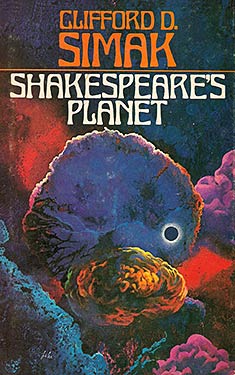Clifford D. Simak
Completed 1/16/2015, Reviewed 1/25/2015
4 stars
Though not considered one of Simak’s better works, I still
loved “Shakespeare’s Planet”. Another
short novel, it represents to me how many of the authors of the golden age of
SF were able to flesh out a story around a simple concept without bloating up
into huge epic novels. In this story,
Simak sticks with his common devices of helpful but slightly annoying robots
and aliens that are not simply anthropomorphisms of common earth creatures,
putting them into a story that I couldn’t help but think was a deconstruction
of Shakespeare’s “The Tempest”. The
result was thinner than the other works of his that I’ve read, but nonetheless
still satisfying.
Carter Horton left earth over a thousand years ago in
suspended animation with a crew of three other humans, a robot, and a computer
consisting of three disembodied human brains.
An accident leaves him the only survivor of the hibernators, and he is
awakened when the spaceship lands on a miserable planet. There he meets Carnivore, a marooned alien
who learned English from a man named Shakespeare, who was also marooned on the
planet while Horton’s ship was still in transit. The planet, it turns out, is one of thousands
connected by a wormhole-like network of transporters built by an unknown alien
race. No one knows exactly how to
program this transport system, leaving their destinations to chance. This planet, however, seems to have been
deliberately set to not permit anyone or anything to leave, signifying the
general sense that this planet holds a secret terror.
The plot is basically pretty thin. To me, the point of the book was more to
reflect on ideas. The first idea that
struck me is the problem with traditional space travel. If a crew leaves the earth today, it may take
us hundreds of years to get to the nearest habitable planet. While in transit, technology will undoubtedly
advance to the point where later space travelers may get to the same
destination faster. It’s reminiscent of
what we’ve already encountered with the Voyager spacecraft. It’s leaving the solar system with an 8086
processor while we’re looking deeper into space with 40 more years of
technological development.
Another is moral ambiguity of alien. The greatest honor of Carnivore’s society is
to destroy alien (to it) monsters before they destroy them. Are we therefore monsters to the alien, in
danger of being destroyed? Or is
Carnivore merely a metaphor for how we view those different from us. Simak explores this issue as Horton establishes
a trusting relationship with Carnivore while reading the paranoid ramblings
about the alien by Shakespeare. And of
course, there are a few other intriguing, imaginative aliens who are also
stranded on the planet.
But like the other books of Simak’s that I’ve read, the
experience is not a plot driven adventure.
It’s about a mood, a setting. And
I think in this case, it’s about having a taste of The Tempest in space. Horton is a sort of Prospero. Science is his magic. Nicodemus, the robot of his crew is his Ariel
and Carnivore, his Caliban. It’s not
nearly as obvious as “Forbidden Planet”, but still seems to be the inspiration
for the book. If I knew Shakespeare
better, I’m sure I’d see more similarities or references to his works in the
text.
“Shakespeare’s Planet” is not a profound book. It’s a wonderfully written little story that
I found a joy to read. There’s just
something about Simak’s prose that is warm, like a comfy quilt, without being
pretentious and maudlin. I give it 4 out of 5 stars.

I think you really captured the essence of the story. I am also a huge Simak fan. Thanks for the review
ReplyDeleteThanks Jude! I appreciate that.
Delete